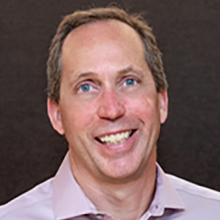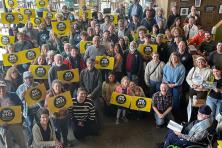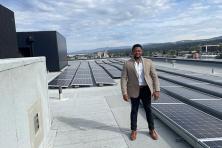We're still catching our breath after this week's annual breakfast with Majora Carter.
Whether or not you were able to attend, it’s worth again sharing a powerful moment from Majora’s keynote address.
Majora shared several inspiring stories from her critical work to revitalize her community in the South Bronx and advocate for jobs in the clean energy sector. She then spoke about Judy Cobb, a woman in rural West Virginia who had for years fought to protect her hometown of Whitesville from the pollution and poverty brought by coal mining:
“I walked around Judy's town that was almost exclusively boarded up. It reminded me of the neighborhood I grew up in, thirty years ago, when most of the storefronts were closed, because there wasn't so much of an economy there.”
Majora’s connection of her work in the South Bronx with Judy’s work in rural coal country reminded us that while communities may look very different from the outside, many suffer from similar circumstances—prosperity limited to an absent few rather than the local many, and a physical environment disproportionately harmed by the pollution and health risks associated with fossil fuel dependence and heavy industry.
As both Majora and I discussed at the breakfast, there is hope in jobs—in local jobs, in clean energy jobs. Some of you may have already seen these numbers or heard these stories, but they are worth highlighting, because they show how strong are the economic arguments for clean energy jobs to help tackle these problems.
Consider:
- According to a new report published by the Department of Energy, in 2016, 373,000 people in the U.S. worked in the solar industry, and 54,000 people worked in coal mining. Meanwhile, the number of people working in the solar industry is now at least 6 times greater than the number of people working in coal mines. Not in 5 or 10 or 20 years. But already, right now.
- I recently read a story in the Washington Post that stunned me. It said, “the fastest-growing occupation in the United States — by a long shot, according to the Bureau of Labor Statistics — might surprise you: wind turbine technician.”
Another piece of hope comes from a most unexpected place- from a newspaper in West Virginia reporting on the words of a leading utility CEO in the state:
“When Chris Beam, the new president of Appalachian Power, talks about economic development, he brings a message that may not be very popular among the coal-focused political leadership in West Virginia...
“Giant businesses Appalachian would like to lure to the state as its future power customers — the Amazons and Googles of the world — make it very clear that when they are scouting locations for facilities like new data centers, they have to go somewhere that can guarantee them a power supply that is generated from 100 percent renewable sources.”
If leaders in West Virginia are talking about a transition to 100% renewables, we can do it here too.
Change is here. But it still is not happening fast enough to catch up to the pace of our warming planet.
That is our job.
There is no place on Earth better to pursue this transition than right here in the Northwest. Our power supply is already relatively clean. We have the opportunity to quickly transition to 100% clean energy faster than anywhere else in the country. We can electrify our buildings, our transportation sector, just about everything.
We have to pursue with curiosity so many questions on this path to 100% clean energy, including how we ensure that a clean energy transition doesn't leave behind those same communities harmed by decades of pollution and resource extraction. As Majora cautioned, there are many daunting questions: "What is the need, how are folks actually going to come to you, do you have an attractive solution, what is the wish you are going to make come true? Are your supporters behind you?”
Given the outpouring of contributions from both our breakfast and Seattle Foundation’s GiveBIG campaign, we already know the answer to that last question! To those that attended the breakfast or made a GiveBIG gift, thank you for supporting Climate Solutions, and for all the incredible work that each of you do. We are thrilled to report we surpassed our $325,000 goal for the breakfast. Combined with gifts via GiveBIG, we raised close to $340,000 for Climate Solutions. Thank you!
Events like our breakfast take a community to make them happen, so I also want to extend appreciation to these supporters of that event:
- Keynote speaker Majora Carter – a national leader at the nexus of climate and equity. Thank you for your determination and inspiration.
- Event speaker Heidi Wills – Thank you for your generosity, compassion, and vision.
- Emcee Hanson Hosein – Thank you for sharing your values of leadership and communication and for being such an incredible emcee at the breakfast.
- Our sponsors, table hosts, table captains, public officials, foundations, donors, guests, and volunteers in the room for making events like our breakfast possible.
- Nonfiction Media for photographing the event and Shew Design for the beautiful design of our printed materials.
For those that could not make it, we still need your support. Please consider making a gift.
Thanks for all you do. We can accelerate clean energy solutions to the climate crisis, and increase health, safety and prosperity for all of our communities, if we all lean in to the challenges together.





